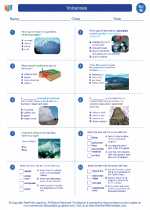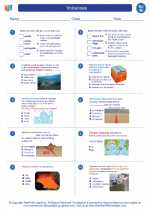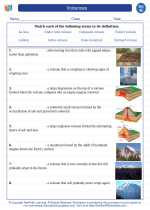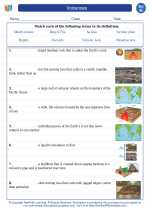Hurricanes
A hurricane is a large storm system characterized by strong winds, heavy rain, and a low-pressure center called the eye. These intense tropical cyclones form over warm ocean waters and can cause significant damage to coastlines and inland areas.
Formation of Hurricanes
Hurricanes form over warm ocean waters when the conditions are right. The key ingredients for hurricane formation include warm ocean temperatures, moisture in the atmosphere, and relatively light winds aloft. As warm air rises from the ocean surface, it cools and condenses, releasing heat and creating thunderstorms. If these thunderstorms persist and organize, they can develop into a tropical depression, then a tropical storm, and eventually a hurricane.
Hurricane Structure
A hurricane has a well-defined structure with a central "eye" of low pressure surrounded by a wall of thunderstorms called the eyewall. The eyewall contains the strongest winds and heaviest rainfall, while the eye itself is typically calm and clear. The entire storm system can span hundreds of miles and produce destructive winds, storm surges, and flooding.
Effects of Hurricanes
Hurricanes can have a range of devastating effects, including widespread damage to buildings and infrastructure, power outages, and loss of life. The strong winds and heavy rainfall can cause flooding, landslides, and erosion, while the storm surge – a rise in sea level due to the storm's winds – can inundate coastal areas. In addition, hurricanes can spawn tornadoes and generate large, powerful waves.
Hurricane Categories
Hurricanes are categorized based on their wind speeds using the Saffir-Simpson Hurricane Wind Scale. The scale ranges from Category 1 (74-95 mph) to Category 5 (157 mph or higher), with higher categories indicating more powerful and potentially catastrophic storms.
Preparation and Safety
Preparing for a hurricane involves securing property, stocking up on supplies, and having a plan for evacuation or sheltering in place. It's important to stay informed about the storm's progress through official sources and to follow any evacuation orders or safety recommendations from local authorities.
Conclusion
Understanding the science and impacts of hurricanes is important for both preparedness and mitigation of their effects. By studying the formation, structure, and effects of hurricanes, we can work to improve forecasting, emergency response, and resilience in vulnerable areas.
[Hurricanes] Related Worksheets and Study Guides:
.◂Science Worksheets and Study Guides Eighth Grade. Volcanoes

 Worksheet/Answer key
Worksheet/Answer key
 Worksheet/Answer key
Worksheet/Answer key
 Vocabulary/Answer key
Vocabulary/Answer key
 Vocabulary/Answer key
Vocabulary/Answer key
 Vocabulary/Answer key
Vocabulary/Answer key
